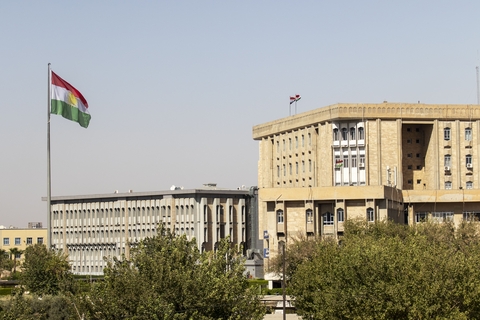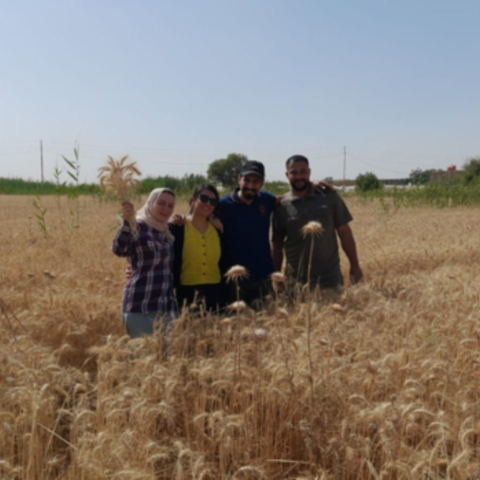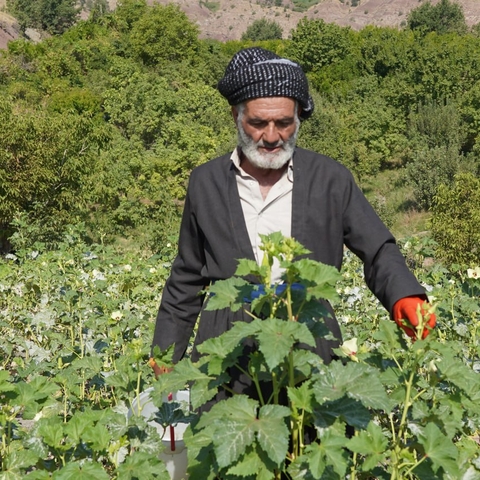The left parties of Iraqi Kurdistan: Divided, but not hopeless.

IMAGO / Depositphotos
On the global stage, Kurdish politics have become known for their strong leftist and feminist movements. In particular, the revolution in Rojava1 received much attention and support from leftist circles worldwide. In Turkey, Kurdish politics are similarly dominated by left-wing factions, including the DEM Party (the successor to a series of now-banned parties, the most recent being the HDP) and the clandestine PKK, (Kurdistan Workers' Party)"., which operates as a guerrilla organization.2 Iranian Kurdistan was the epicenter of the Iranian Woman, Life, Freedom protests following the murder of Jina Amini by the Iranian police.
However, Iraqi Kurdistan is an exception, lacking a prominent leftist movement. Its social democratic party – the Patriotic Union of Kurdistan (PUK), has long embedded itself in tribal patronage networks4 and entirely lost its ideological underpinnings. Abdullah Öcalan’s “democratic confederalist” current, which has gained traction in other Kurdish regions, also failed to take root here. In the Kurdistan Region’s parliamentary elections on October 20, 2024, the Communist Party lost its only parliamentary seat, marking the end of leftist representation in parliament.
The tribally-embedded left: Former socialists.
Historically, Iraqi Kurdistan had a stronger leftist current than nowadays. The PUK, the party that today dominates the eastern part of the Kurdistan Region with its Peshmerga forces, started in 1975 as a left-wing split-off from the Kurdistan Democratic Party (KDP). It initially acted as an alliance of various leftist currents under the leadership of Jalal Talabani3 In the first three decades after its foundation, however, the PUK underwent a profound ideological degradation as it built its power through extensive tribal patronage networks rather than political organizing.
The egalitarian agenda has faded, leaving the PUK nearly indistinguishable from the KDP. Party elites consolidate control over the security apparatus and leverage their wealth to establish themselves as economic5 and media moguls.6
The most notable split-off from the PUK, the social liberal Gorran, was founded by Nawshirwan Mustafa in 2009 and focused on anti-corruption and civil liberties. While the party rallied considerable support against the KDP-PUK duopoly in the following two regional elections, receiving well over 20% each, it ultimately got co-opted by the ruling parties and joined the government.7 With its image tarnished and competition from new liberal parties, the decline was inevitable. Leading politicians left the party, and with 0.6% in the regional elections on October 20, 2024, Gorran barely managed to win one seat.
Communists: Between repression and tribal networks
The Kurdistan Communist Party (KCP), along with the Kurdistan Toilers’ Party (Zehmetkêşan) and the Movement of the Democratic People of Kurdistan (MDPK), represents a part of the left that hasn’t experienced the same ideological degradation as the PUK. These parties didn’t go through an ideological degradation to the same degree as the PUK.8 However, they still house deep-rooted structural problems that have kept them from becoming a force able to challenge the status quo. Restricted to a maximum of two parliamentary seats since 2009, their political weight has always been negligible.
For the 2024 elections, KCP and Zehmetkêşan allied with the Kurdistan Social Democratic Party (KSDP). The KSDP is entrenched in tribal patronage networks, controls a Peshmerga unit, and its only MP before the 2024 elections was a minister in the government.9 Its nepotist structure was laid bare earlier this year when a struggle between party leader Mohammed Haji Mahmoud and his brother escalated over control of party institutions, such as the party’s soccer club,10 resulting in gunfights and a killed bodyguard.11
In a somewhat puzzling move, KCP and Zehmetkêşan had allied with the KSDP after the scandal became public. The alliance performed poorly, receiving only 0.7% of the votes, during which the Communist Party lost the only parliamentary seat it had held since 2009.
Before 1993, the KCP was a branch of the Iraqi Communist Party. Following the Ba’athist coup in 1963, a large number of communists were executed, including the party leader Salam Adil. It’s difficult to reconstruct how many were killed in the early days of Saddam Hussein’s regime, but estimations range from dozens12 over 340 up to over 5,000 victims.13
In the following decades, the Ba’athist regime executed dozens to hundreds of communists every odd year.14 The Ba’athist reactionary terror culminated in the Anfal campaign in 1988, where between 50,000 and 100,000 Kurdish civilians were massacred.15 At that time, the Communist Party went underground and started waging guerilla operations.16
In the 1990s, some communists left their party for the KDP, which significantly profited from their skills in effective propaganda. Meanwhile, Soran and the neighboring Rewandiz northeast of Erbil had become a stronghold of the Communist Party. A side effect of this was that the KCP became tribally embedded locally. An anonymous leftist from the area describes those called communists as often not close to the ideology. Instead, families with a communist grandfather might be referred to as communists nowadays, forming group identities closer to a tribe than an ideological party.
The party also faced violent repression. In 2008, Nahla al-Shaly, the leader of the women’s wing of the KCP, was decapitated by unknown assailants in Kirkuk. The party closely followed and supported protests in December 2020 for the payment of the salaries of civil servants that had been delayed for months. The protesters' demands soon expanded to include points like combating widespread corruption, nepotism, and mass unemployment. The protests were repressed violently by police forces, resulting in the death of ten protesters, numerous arrests, and a crackdown on independent media.17
Among a new generation of young communists, the KCP has had difficulty finding a lot of support. Aside from the accusation of tribalism, some criticize that the party is led by an overaged cadre that sees itself as avant-garde and acts as a gatekeeper, hindering young people from becoming involved in the party. Its slowly eroding electoral results show the party’s failure to rejuvenate. Counteracting this development by forming alliances with openly nepotist parties has proven futile. If anything, it has alienated voters looking for an alternative. To be part of a possible resurgence of the left, it needs to kick off a process of self-reflection and internal reforms.
The democratic confederalists
In contrast to Rojava and Turkey, the democratic confederalist current is only a marginal force in Iraqi Kurdish society. There are guerillas of the PKK in the Iraqi Kurdish mountains near the Turkish border fighting against the Turkish army. However, they are almost entirely Kurds from Turkey and do not hold influence in the political culture of Iraqi Kurdistan. Their positions are located in remote mountainous areas with numerous hideouts, and the Turkish military strikes them indiscriminately, often causing civilian casualties18.
The movement’s offshoot in Iraqi Kurdistan, the Kurdistan Democratic Solution Party (PÇDK), was established in 200219. The party never gained a standing in society, partly due to repression from the Iraqi Kurdish authorities. In 2014, the party was banned, and members in the KDP-controlled territories were taken into custody. The party later dissolved itself, and members joined the newly formed successor party Tevgerî Azadiyî20. The core tenets of democratic confederalist parties include the creation of a decentrally organized, participatory council democracy and reject the hierarchies inherent to the state. This somewhat contrasts with the cadre structures present in many democratic confederalist organizations, a remnant of its Marxist-Leninist past. Apart from that, feminism, cooperatives and commons, as well as ecology play a central role in the movement’s ideology21.
The new party Tevgerî Azadiyî was never allowed to run in a regional election and was regularly confronted with its members' arrests and offices closures22. Most notably, the party also faced assassinations of party members in 202223 and 202424. Even though the party attempted to engage with society and supported the 2020 and 2021 civil servants’ and students’ protests, the repression achieved its purpose. It hindered the party from becoming a relevant political actor.
In August this year, the Supreme Judicial Council of Iraq banned Tevgerî Azadiyî, citing connections to the PKK. The PKK had been banned by the Iraqi government less than a month earlier amidst an improvement in relations between Iraq and the Turkish government25. The leadership criticized the ban as a political maneuver influenced by foreign interests and emphasized its independence26. While the movement might try to create a new party, the authorities won´t change their approach. The best chances for a re-foundation would probably be in Kurdish areas outside of the Kurdistan region, such as Kirkuk, where security forces are acting less hostile.
A new generation and the potential of a leftist renaissance
With little perspective for change coming from parties embedded in the tribal system and little appeal to the disenfranchised youth or the heavily repressed democratic confederalists, it may be worth looking at what is happening among young leftists from the autonomous region.
Zheera Hassan27, a communist from Silemani, explained that a young generation of college students and graduates started to organize themselves in recent years. These people haven’t been politicized by their families or the existing parties and constitute a new wave disconnected from historical Kurdish leftist traditions. Instead, they familiarized themselves with international communist theory in small groups. Due to the fragmented nature of these groups and their precaution regarding public appearances – a reaction to the repression leftists before them were confronted with – it is hard to say how significant this new generation of leftists is.
Regarding the 2024 elections, few of them had any hope that these could bring about any positive developments. Consequentially, many chose to boycott the elections. An example is the leftist group Xerman Sûr, who criticized the election in a statement that it would have no potential for change as long as the ones in power control the economy and the Peshmerga28. The young leftists are not alone in their disillusionment regarding the elections. Though many disenfranchised individuals outside the patronage networks yearn for economic and political reform, few believe the established parties can or are interested in achieving this29.
These small communist circles consider moving beyond theory sessions, engaging in direct action, and reaching out to other groups. While they are skeptical towards most established parties, there is an exception: the Worker-Communist Party of Kurdistan. It is a small anti-authoritarian communist party influenced by the work of Iranian Marxist leader Mansoor Hekmat, whose views included seeing the Soviet Union as a state capitalist obstacle to the development of communism30. The party tried to build structures across the region in the 1980s and 90s. However, due to repression from PUK and KDP, these were short-lived, and further activities remained limited in scale31. Two of the party’s leaders were even assassinated32. Today, the party is mainly active in the diaspora, especially in the UK and Australia33. The party chose to boycott the 2024 elections, claiming the process would have been pre-designed to ensure the success of the ruling parties, could not bring about change, and that participating would only lend legitimacy to the ruling parties34. This hard stance gained respect among the young leftists, who considered reaching out to the party and learning from their experiences and skills.
Another spot to look for a possible resurgence of the left is the former left wing of Gorran, the party that collapsed in the 2024 elections. The faction’s most prominent former member, Abdulay Mala Nuri, is highly popular on social media. Nuri strongly came out in support of the protest 2020 and 2021 protest movements. In November 2021, he published the manifest for a party called “Congress for Environment and Democracy.” However, he said the party never materialized, and for the 2024 elections, he endorsed his former party, Gorran, while citing the leftist philosopher Slavoj Žižek on the importance of recognizing mistakes35. If Nuri chooses to create a new political force – now that Gorran is pretty much history – it could quickly become a relevant political force in the autonomous region.
A look towards the future
There's no way to sugarcoat it: The left in Iraqi Kurdistan is in disarray. However, there are some signs of new development on the horizon. Considering the intense social contradictions plaguing the autonomous region – a wealthy elite with villas in the Global North36, their own military and control over the economy and media, and in contrast, masses outside the patronage system that are either exploited or unemployed – certainly are fertile ground for a strong leftist movement. The high unemployment rate among young adults has caused an exodus37, corruption is widespread, and violence against women is a daily occurrence. All these factors leave no doubt: there is potential for leftist organizers if they manage to navigate the intricate system of repression the KDP-PUK duopoly has established over the decades.
The most promising hopes for reviving the Iraqi Kurdish left lie with the new generation of communists or Abdulay Mala Nuri, should he move forward with founding a party—two paths with vastly different outcomes. Regardless of where change emerges, leftists must overcome puritan reflexes and embrace ideological plurality to make an impact. History shows this won’t be easy, and state repression will only add to the challenge. But without a strong left, the suffering of the exploited will go unchallenged while a corrupt oligarchy controls government, economy, and military. And what better way to resist than together?
- 1
„Rojava“ means „West“ in Kurdish, which refers to the location of the Syrian Kurdistan in relation to the other three parts of Kurdistan; the official name is Autonomous Administration of North and East Syria (AANES).It isn’t a specifically Kurdish autonomous area and includes other ethnic groups such as Arabs, Assyrians, Armenians and Turkmens.
- 2
https://www.kurdishpeace.org/research/democracy/the-pro-kurdish-political-movement-in-turkey/
- 4
- 3
https://dckurd.org/2018/07/26/patriotic-union-of-kurdistan-puk/
- 5
- 6
https://chmk.org/nechirvan-barzanis-association-with-media-corruption/ or https://x.com/KurdistanWatch/status/1843278391627198478
- 7
https://onlinelibrary.wiley.com/doi/epdf/10.1111/dome.12258 pp. 34
- 8
- 9
- 10
- 11
- 12
Tareekh al-Iraq - Sheikh Qasim al Nuami, p. 65-66
- 13
https://archive.globalpolicy.org/security/issues/iraq/history/1963cialist.htm
- 14
https://www.gfbv.de/de/news/a-chronology-of-terror-under-saddam-hussein-627/
- 15
https://books.google.de/books?id=qidfVsS-z8YC&q=50,000&redir_esc=y#v=snippet&q=50%2C000&f=false
- 16
https://www.peoplesworld.org/article/red-star-over-iraqi-kurdistan/
- 17
https://www.peoplesworld.org/article/red-star-over-iraqi-kurdistan/
- 18
https://airwars.org/civilian-casualties/?belligerent=turkish-military&country=iraq
- 19
https://ore.exeter.ac.uk/repository/bitstream/handle/10871/37252/KeskinS.pdf p. 205
- 20
https://ore.exeter.ac.uk/repository/bitstream/handle/10871/37252/KeskinS.pdf p. 22
- 21
https://www.kurdishinstitute.be/en/the-political-concept-of-democratic-confederalism/
- 22
- 23
- 24
- 25
https://apnews.com/article/iraq-turkey-pkk-kurdish-separatist-ban-de9c0a6a0517bb4b48b3d915e71e0f4c
- 26
- 27
- 28
- 29
https://inkstickmedia.com/in-iraqi-kurdistan-upcoming-elections-do-little-to-inspire-voters/
- 30
- 31
https://www.refworld.org/reference/countryrep/amnesty/1995/en/91502
- 32
https://www.kurdistanpost.nu/?mod=news&id=78414&sdate=4/19/2015
- 33
- 34
- 35
- 36
https://prospect.org/power/cowboy-drugstore-traces-of-a-kleptocrat/
- 37
https://thearabweekly.com/joblessness-drives-desperate-young-iraqi-kurds-emigrate


